As far as I know you have played in a number of bands before until you met and formed group A. Did you intuitively know you have found the right partner, and what were the common things that made it easy for you to start?
Tommi: I had been in 2 bands before, one in London and one after I got back to Tokyo. I was looking for someone to start making music again, when I met Sayaka as my second band had been kind of split up. As soon as I started talking to Sayaka I knew we could do something fun together, I guess it was just the feeling. Nothing serious, but I thought maybe something just for fun, something crazy for a laugh. And we went to studio the following week I think.
Sayaka: group A is the first band I’ve ever been in. This is my first experience with making music, so every step is new to me. We just formed for fun, no struggle and no right or wrong when it started.
Tommi, was the music you did before very different to group A? With what kinds of genres and style elements did you experiment so far?
Tommi: My first band was punk. One of my closest friends in London brought this idea of me singing and shouting in Japanese in the centre. I played around with Pro-One too and that was my first synth experience. It was a great fun! And i got back to Japan and wanted to continue making music and got a guitarist from my friends’ punk band which was or had been disbanded at that point, and a friend of mine who just moved to Tokyo from England who used to play drums. I was listening to the late 70′s post-punk those days and I picked up a bass guitar and started practicing along with Jah Wobble’s bass lines on early PIL records. I was into reggae and dub too. So my second band sounded pretty much like those late 70′s classic post-punk bands I think, minimal and obscure up-tempo drums with dubby bass lines and Keith Levene/Viv Albertine influenced strings.
Was there some firm idea about how group A should sound, or did you just start playing to see what will happen?
Tommi: We actually never thought we would really play music at the beginning.. It feels weird every time I look back. I guess we were more focusing on performance? I don’t even know what we were trying to do at all. We weren’t really making music until the vocalist left and it became just two of us Thats when we actually started making music I think.
Sayaka: Yes, we just started jamming in the studio without any proper musical skills, just for fun and it is still going on..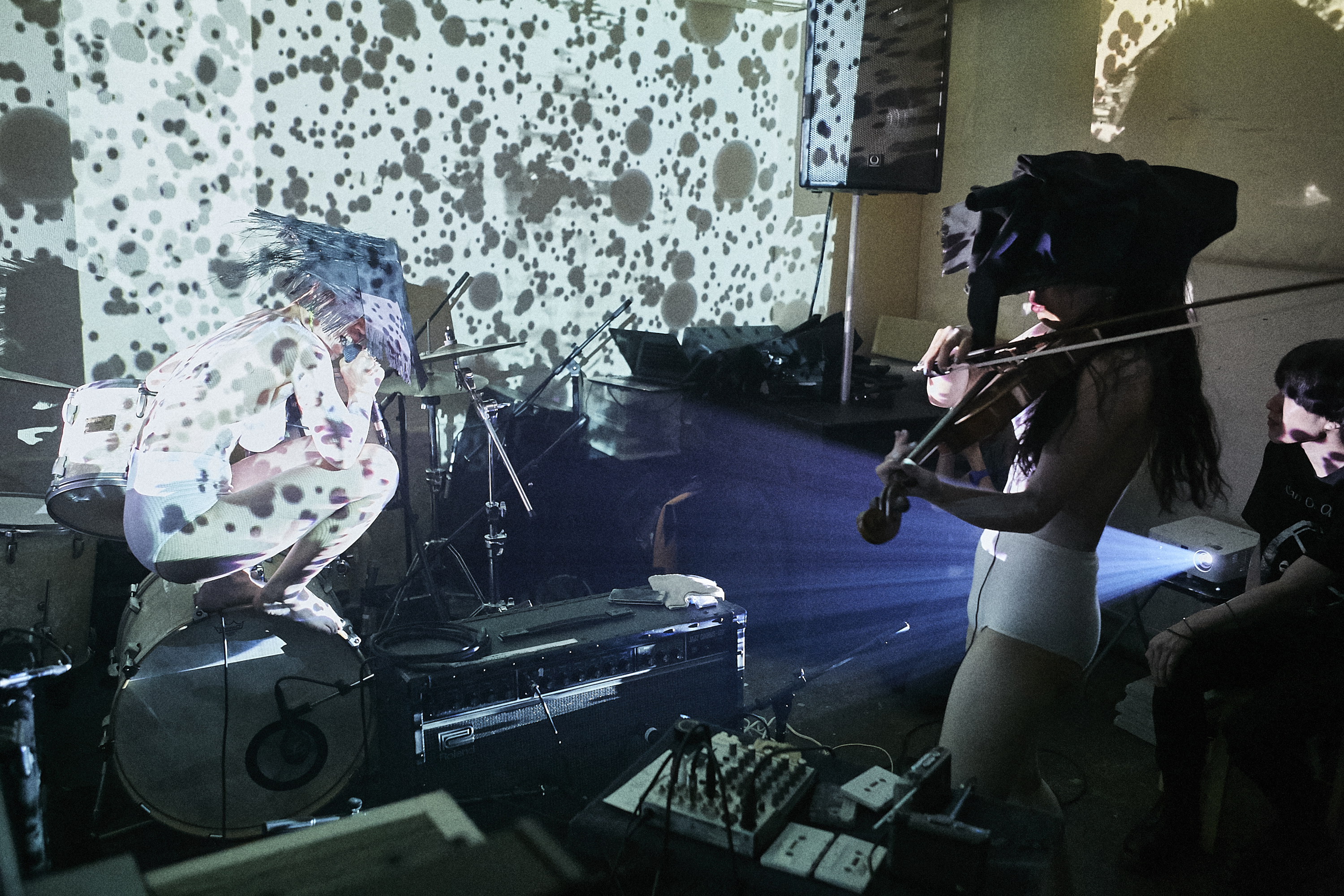
Your music is often compared to classical new wave or industrial bands, and I’m sure you like stuff like that. On the other hand, musical influence is not necessarily the same as ”sounding like…”. Could you name some untypical influences that shaped your ideas?
Tommi: The spirituality of Shinto. And maybe Buddhism too. I would not say I am particularly religious though, my family are buddhists and I have brought up attending all sorts of ceremonies in the traditional Japanese Buddhism way. Also the education in Japan is based on the idea of Shinto and Buddhism I assume (it is/has been changing a lot, though), so as you grow up in Japan you actually learn a lot about these religions almost unconsciously. I got interested and became aware of how much I might actually believe, or like the idea of those traditional religions when I came back from London, and got more into it when I studied history in a design college. I started my visual design course about the same time as we started playing, and I was getting a lot of new ideas in the classes during the day and going back to studio all excited with new inspirations and telling Sayaka all about it. So my design studies became quite inseparable with my creativity in group A. Histories of designs, films, media, architectures, photography, typography, religions, wars, politics.. so much.
Sayaka: Obviously the music I’ve been listening to influenced me a lot. When it turns to making music, I always get an inspiration from a certain word, from stories and feelings I have at the moment, visualise them in my head and convert them into music.
In the beginning you had a third member. Is it now fixed that you’re a duo, or is it more open for shifts and collaborations in the future?
Tommi: I’m interested in playing with animals, horses in particular. I’m bored with humans. Only if they are up for it though, I imagine it’d be great. Or, if I had to choose a human being, i’d like to get someone who plays oil drums like Bongo Joe (George Coleman).
Sayaka: group A is literally ‘a group’. We often collaborate with visual artists, lighting artists and so on…they are all the members of group A. My violin, pedals and Tommi’s synths are also the members. It’s flexible.
How did your experience abroad shape your look on things and your approach to creating music?
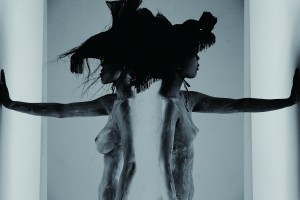 Tommi: To me living in Europe feels much more comfortable, it just feels right. I couldn’t imagine staying in Japan for whole of my life at all. I never felt I fit in Japan, that doesn’t particularly mean I feel like I fit in Europe, but it feels like I fit slightly better. So.. to me there’s no hometown or abroad really.. I just don’t think in that way. After living in London for several years I felt like Tokyo was a totally new place.
Tommi: To me living in Europe feels much more comfortable, it just feels right. I couldn’t imagine staying in Japan for whole of my life at all. I never felt I fit in Japan, that doesn’t particularly mean I feel like I fit in Europe, but it feels like I fit slightly better. So.. to me there’s no hometown or abroad really.. I just don’t think in that way. After living in London for several years I felt like Tokyo was a totally new place.
I guess since I was a kid I have been looking at things in a perspective quite different to others, which I find hard to explain in words. But, if I just focus on our sound, group A would have never sounded like how we sound if we hadn’t formed in Tokyo. I’m not saying this because I was listening to Japanese experimental music in Tokyo, I wasn’t, I never listened to Japanese music until I started making music with Sayaka to be honest, apart from Tokyo Rockers (Japanese post-punk from the late 70s). I guess in Tokyo there’s just this feeling, that you just do whatever you want, if not at least I was in that mood when we started then.
Sayaka: I started doing music when I moved back to Tokyo so I was a pure music listener while living in London. Life in London recreated me to a broad minded person through the chaotic immigrant situations etc, and made me start to look at the many layers behind the scenes. I would say it affected the creation process very much.
So you never consodered yourselves as a “local” band I guess. I mention this because in some countries, alternative or underground cultures seem to share a very local identity, focused on a certain urban or national environment. l’m not sure how strong this is in Japan or Tokyo…
Tommi: NEVER. I never feel like I fit anywhere as I said, and that has not been changed since I was a kid. I don’t have that “local” feeling at all. I’m always too different to anybody in Japan. So I never considered group A as a local band in Tokyo.
Sayaka: Not at all. I always prefer to be a non-partisan.
Do you see yourselves more as composers or as performers? Do you feel more at home in studio or on stage?
Tommi: Both. Playing on stage is performing to me, not just playing music live. Studio feels like home, stage feels like a place for our ritual.
Sayaka: To be honest I’ve never felt myself as a composer or a performer. Just exploding myself – what I and we feel/think/wonder- in either studio and on stage. I love the process of making songs, but also playing live, develop the whole world and give the experience to the audience.
As you wear these fancy costumes during your shows, would you say, that there is also a kind of role play in? If yes, how would you describe your stage personas?
Tommi: No.
Is the style and iconography of your stage outfit just your own creation, or does it also refer to some Japanese or other cultural tradition?
Tommi: I do get inspired by traditional ritual costumes all over the world, but our stuff is not particularly related to any of those.
Sayaka: It mostly refers to our music, the key of two conflicting words – primitive and electronic.
At this point we could elaborate on the various stereotypes that Europeans share about Japanese culture, from the romantic cherry blossom thing to Mangas and all postmodern cliches about Japan as a culture of extremes, and about the annoying and at the same time funny aspects of that. But even with a sophisticated meta level you would somehow stay the exotic subject and we the interpreters. I would however like to know what kinds of stereotypes Japanese people use to share about Europe. What kinds of cliches would you advice me to play with if I would visit your country?
Tommi: That’s difficult, since we’ve lived in Western countries for several years now, and Tokyo is an international city. I’m so used to European cultures.
Sayaka: So called stereotype-cliches are quite lovable at some point..having a bottle of Sake under the full-blooming cherry blossom trees is beyond beauty and you’ve never had the experience outside of Japan. Romanticism and the rich cultural heritage are also some lovable cliches about Europe I think..
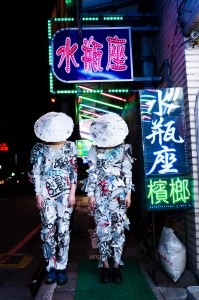 What can you tell about the ideas behind your new album and how it developed? As far as I know it was all recorded live at the renowned Soup venue?
What can you tell about the ideas behind your new album and how it developed? As far as I know it was all recorded live at the renowned Soup venue?
Tommi: After we got back to Tokyo from our first European tour in May last year, I felt that we needed to make a new album for the next European tour, which started in September. We had a few unreleased tracks so we worked on a few more tracks to make it an album. We didn’t have much time, and much budget either as the first tour didn’t pay off at all, well it was more of an investment anyway. So really a live recording was the only way of making it happen, so that we could sell tickets and with that money we could pay our mixing and mastering.
What are in your opinion its main differences compared to previous releases in regard to the sound and lyrical content?
Tommi: The second album was fantasy and the third is reality. The first album was more of an EP, on which we gathered songs we were playing at gigs that time and there wasn’t a particular thought behind. So the second album was really the first album for us, and we thought we wanted to lead people to our world of imagination, somewhere deep inside us. I was studying the history of Japanese religions, Shinto and Buddhism, in my graphic design course that time and was getting loads of inspirations from that. On the other hand, what made the third album different to the second album was that we recorded last summer when there was a lot of arguments and demonstrations going on against the Japanese government’s debating about the national security bills, that would expand the roll of the self-defense forces. It was the 70years anniversary since the end of the pacific war and we were to celebrate, and all of the sudden there was a fear of our own country going to join war again.. So that feelings of fear, and most of all, anger for the government were pretty much put into the album.
You once stated that you’re quite unexperienced in creating rhythms, and therefore do a lot of stuff quite spontaneously by experiment and the use of effects. How did you create the strong rhythms for instance in ”Liar Lier” and ”Suffocated”?
Tommi: I just use cheap drum machines and cheap guitar pedals for effects. I don’t have money and thats what keeps me being experimental. Plus I don’t have much clue about frequency and equalizing, so some people who have that kind of knowledge might find our sound a bit too much. Which I really don’t care about.
In ”Liar Lier” you shout against politicians, earlier you incorporated political news snippets in your costumes, and on fb you posted about the opposition between beauty and war. Though you don’t see yourselves as political artists, is it important for you to create a certain awareness?
Tommi: I think we are quite political. That’s not our main focus though. I think we are as political as anybody else in general. I can’t write poetic lyrics about love or dreams or fantasy, I ain’t got no time for those things. So the things coming out from my mouth are likely to be related to politics or social issues, as we make music with our anger. But at the same time I try not to inspire people too much with my point of view or offend anybody with my words, everybody has a different opinion. So in that way we ain’t not political. I tend to put loads of effects on my vocals, so my words don’t stand out too much.
The atmosphere of your music is very ritualistic, as it is concentrated, powerful and hypnotizing at the same time. You also had a title called ”Initiation”. Do you think your music can function as a rite of passage for you and the audience? What kinds of energy would you like to transmit?
Tommi: Music is ritual. Listening or playing, music purifies my soul. Thats all, I don’t think too much.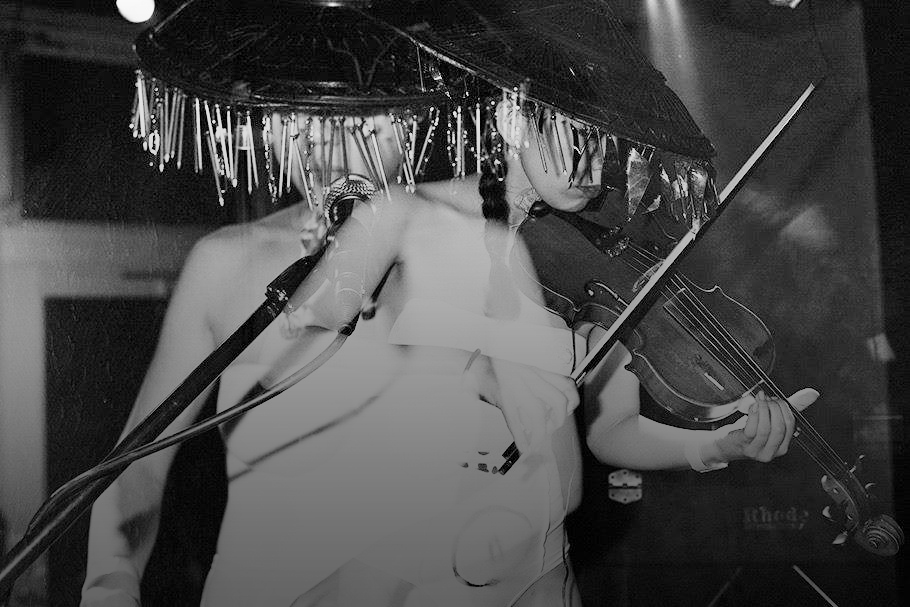
So your interest in ritual is more of an intuitive and spontaneous nature and not so much based on theory…
Tommi: Both maybe. I am interested in rituals, it is fascinating for sure, but i don’t know much about it. I just create my own way.
Sayaka: It’s 2016 now and we live in the scientific, intellective modern society, but we still have unexplained phenomenons in this world. You use your imagination when you make music. Imagination is unexplained and unanalyzable. The hypnotic waves in music are a result of that, obviously unexplained. I do believe in the things in that way.
You once mentioned Shinto rites as inspiring for you. Did you grow up in a religious or spiritual environment and was Shinto and Buddhist belief part of your education?
Tommi: Very much. The educations in Japan are based in Buddhism and Shinto most of the time I guess. Also my family was devout buddhists, that was normal until about maybe 90s, its just the good old time when people still used to follow the long established customs you know. So i was doing pretty much all the ceremonies in buddhism way, or Shinto way, and that was the good old Japan i loved. Now its changed so much and nobody gives a fuck about those beautiful things anymore, especially in Tokyo. It’s become too americanised, too international. Too bad.
Sayaka: Most of Japanese people in general are grew up in an irreligious family (not non-religious). We do a funeral by following Buddhism and chant, we pray to Buddha when we go to the temple and we do wedding ceremonies by following Shinto, pray to the Shinto god when we go to shrines. That is more like..tradition than the faith. I grew up in a religious family and naturally built myself with a spiritual thought. I love the idea of Shinto-you are the creation of the ancestors and the nature. And its Polytheism aspect-many similarities between Animism. The religion always inspires me a lot.
You’ve moved to Berlin a couple of weeks ago and have already played some shows.. How is your experience so far and what do you think makes this city so interesting for musicians?
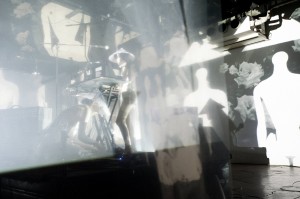 Tommi: It’s heaven. I literally have everything I love here, from dark wave scene, post-war architectures, to those tasty beers. I don’t know why its so special here yet though, I came to find out. I bet the government’s supports for artists are one big thing that makes it very different to London, Tokyo or any other big cities.
Tommi: It’s heaven. I literally have everything I love here, from dark wave scene, post-war architectures, to those tasty beers. I don’t know why its so special here yet though, I came to find out. I bet the government’s supports for artists are one big thing that makes it very different to London, Tokyo or any other big cities.
Sayaka: It’s been amazing so far. Luckily we are having occasions to play not only regular shows but also some experimental sessions. What is good about being in Berlin for musicians is the fact:music is so close to people and their daily lives. People are conscious that music is a part of their culture and appreciating it.
What is your favourite German food so far? Do you miss rice?
Tommi:I do miss rice yes. I haven’t really tried any German food actually, i’d love too but seems meaty. German breads are good, those with grains not white. But i don’t think my stomach digests it very well so i never eat them.. The chips aren’t bad. I’m a beer lover so i’m just happy drinking German beers all the time.
Sayaka: I love German bread, baked with lots of seeds. I do miss the taste of Sake more than steamed sticky rice itself!
What are you doing besides group A since you play together? Sayaka, you also did a solo violin film soundtrack recently, as I heard…
Sayaka: Sometimes I join a free-form session as a violinist, DJ with two cassette tape players, play some freaky strings for short films, and on an irregular base I do a complete improv analog-dance music duo:Albino Botanic with a Red bull music academy participant Albino Sound.
Tommi: I do graphic design and photography.
What are your next plans? Which places would you especially love to play live? I also heard about a rerelease on tape…
Tommi: I’d just like to concentrate on creating new sounds for a while. This world and reality seem too sad to accept sometimes, and music is the only thing that never betrays me. New record soon hopefully. I’d love to play anywhere we haven’t been, caves, beach, forest, mountains, old quarry stocks, underground car parks, abandoned buildings, factories, brutalism buildings, where ever.
Sayaka: We have set up our own studio in Berlin and started jamming. There are hints for new songs and they sound quite different from other songs we’ve made. Hopefully releasing a new record on vinyl, and also on tape.
